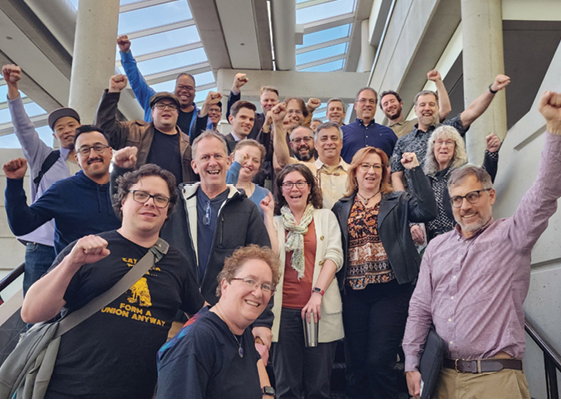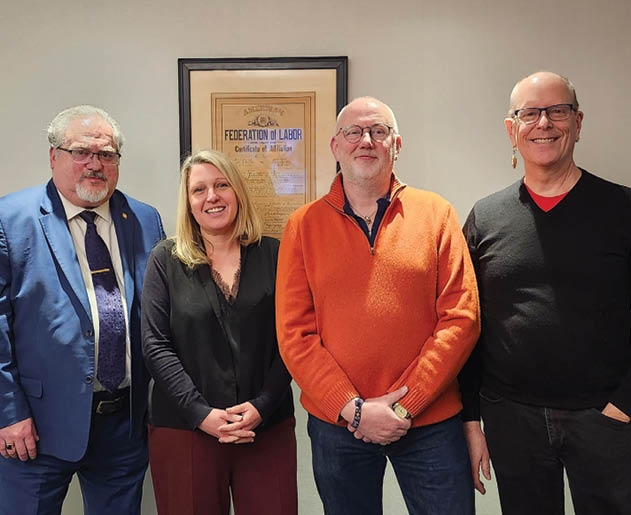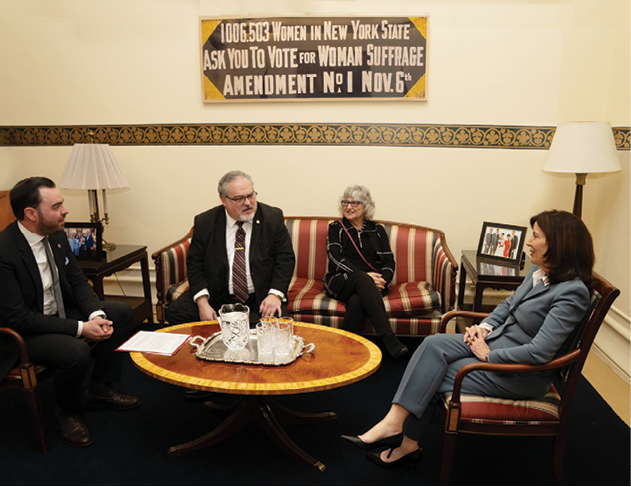Before 2010, New York and Los Angeles were the leading centers for film scoring. Due to producers’ desire to cut costs, most nonsignatory film scoring has been done overseas in recent years. Although scoring makes up a small portion of a blockbuster film’s budget, often less than .05%, by 2018 most film productions that didn’t have union agreements had moved their scoring overseas. Many of these recordings are now made by nonunion orchestras in Central and Eastern European countries.
This spring, one of our primary focuses has been on state lobbying efforts to ensure that more motion picture and television scoring work is done in the US and Canada.
California: A Stronger Voice in Sacramento
The AFM has taken a strong, proactive stance to ensure musicians’ voices are heard in Sacramento by joining the Entertainment Union Coalition (EUC). This multi-union alliance is dedicated to advocating for entertainment industry members on public policy issues in California and collectively represents over 165,000 workers in the state’s entertainment sector.
I have appointed Local 47 (Los Angeles, CA) President Stephanie O’Keefe and AFM Director of Government Affairs Ben Kessler as our liaisons. Thanks to their work and dedication, the AFM now has a seat at the table among the other arts and entertainment unions and guilds, including California IATSE Council, Directors Guild of America, LiUNA! Local 724, Teamsters Local 399, Writers Guild of America West, and SAG-AFTRA.
The EUC has been a vocal advocate for the entertainment industry in discussions around California Governor Gavin Newsom’s 2025-2026 budget. When production companies are bound by our contracts, and more film and television production takes place in California, that means more work for AFM members. It is clear to me that Newsom’s proposed expansion of the California Film and Television Job Program to $750 million will benefit working musicians. The increase will make California’s incentive program competitive with those in other countries. It will do so as a true jobs package.
We thank our members and AFM local leaders throughout California who submitted letters of support for AB 1138 and SB 630 to key chair and committee members in Sacramento during April. These film and television modernization bills are critical to bringing back film and television jobs, strengthening the domestic entertainment industry, and ensuring California remains a global center for film and television.
New York State: Celebrating New Scoring Incentives
Last month, we celebrated new tax incentives for film scoring in New York State. To fight the offshoring of music scoring through legislation, AFM and Local 802 officers and staff, including former President Sara Cutler and current President Bob Suttmann, Financial Vice President Karen Fisher, and Chief of Staff Dan Point, traveled to Albany to lobby state legislators and build meaningful relationships.
Under a new provision, producers have a financial incentive to score their made-in-New York projects in the state. If they hire at least five musicians to record a qualified project in New York, they will receive a 10% uplift rebate or tax credit on scoring costs from the state, on top of the standard 40% credit. If scoring is conducted in Upstate New York, there is an additional 10% uplift, meaning producers could see rebates of scoring costs as high as 60%.
I appreciate New York Governor Kathy Hochul’s support for this legislation. This has been a passion project of mine since I became president of Local 802 in 2010. It is essential that the tax credit program truly benefits all aspects of the New York State creative economy, including AFM scoring musicians.
New Jersey: Closing Loopholes for Domestic Work
We are currently working with AFM local union leaders in New Jersey on film tax incentive legislation to ensure that film scoring work is produced domestically.
The Garden State Film and Digital Media Jobs Act, passed in 2018, gives tax credits to attract film and digital media productions to New Jersey. To get the tax credit, producers must spend a certain amount on hiring in-state workers and spend a certain amount on in-state vendors. It’s a great program, establishing New Jersey as a top-tier filmmaking destination but there is no direct incentive to keep the film scoring work at home.
Local 16-248 (Newark, NJ) President Tony Scally and Local 16-248 Executive Board Member Dave Schneck, along with Local 62 (Trenton, NJ) President Buzz Herman and Local 399 (Asbury Park, NJ) President Jim McIlvain and Secretary Curt Morton, have been working steadily to help move the bipartisan S4392 and A4382 bills through the New Jersey legislature. These crucial bills, sponsored by Senator Joseph Lagana for S4392, and Assemblymembers William Sampson, Barbara McCann Stamato, and Dawn Fantasia for A4382, aim to incentivize producers to hire domestic musicians for scoring sessions, rather than outsourcing the work to Europe. More information can be found at www.nj.fairsharemusic.org.
Continuing the Fight for AFM Member Jobs
Of course, this work extends beyond the impact of tax incentives; the important work to ensure more jobs for AFM members across the US and Canada continues. The AFM is committed to increasing work opportunities for all members under Electronic Media Services Division (EMSD) recording contracts by actively engaging with both musicians and local officers. This includes offering education, resources, and support to ensure proper contract filing and compliance. The EMSD works to demystify the various AFM agreements, from the Sound Recording Labor Agreement (SRLA) to specialized contracts for low-budget projects and new media.
By highlighting the advantages of union contracts—including fair wages, pension and health contributions, and residual payments for “new use” and supplemental markets—the AFM empowers members and encourages employers to participate, ultimately broadening union opportunities in the constantly changing recording industry.
Read More




